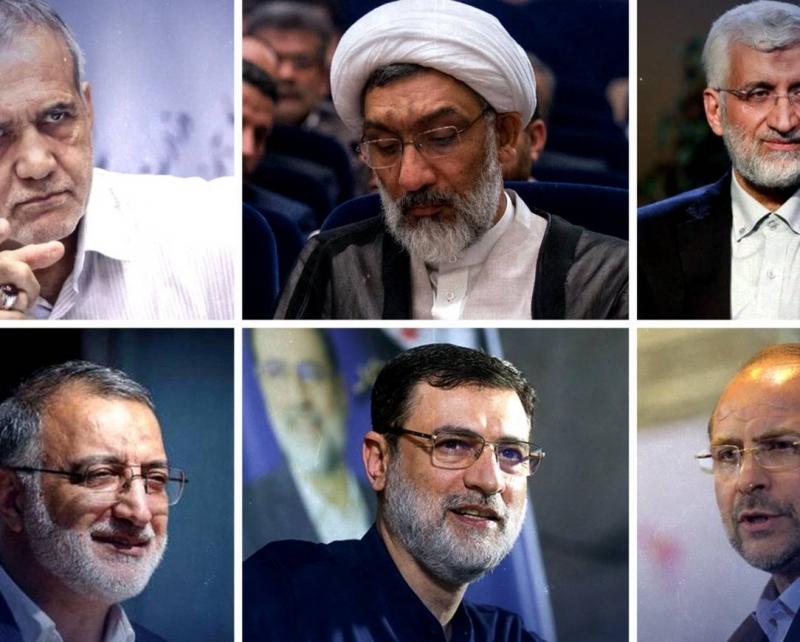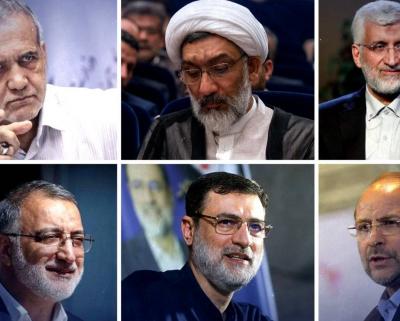The Guardian Council announced the completion of the list of qualified candidates from the nearly 80 Iranians who applied to run in the presidential elections set for June 28. Spokesman for the Guardian Council, Hadi Tahan Nazif, stated that "the council sent the results of the candidates' qualification studies for the presidential election to the Ministry of Interior." Nazif wrote in a tweet on the platform "X" that "with the completion of the verification of the candidates' qualifications for the fourteenth presidential election by the Guardian Council, the list of qualified candidates has been sent to the Ministry of Interior."
The Ministry of Interior announced the names of the qualified candidates for the fourteenth presidential elections as follows:
1. Masoud Bazargan
2. Mostafa Pourmohammadi
3. Saeed Jalili
4. Ali Reza Zakani
5. Amir Hossein Ghazizadeh Hashemi
6. Mohammad Baqer Qalibaf
**Who are the Candidates?**
**Masoud Bazargani**
He serves as the representative of Tabriz in parliament, is among the reformists and moderates, and announced his candidacy. He was also present in the eighth and ninth parliamentary sessions. In the tenth session, he was the first deputy of the council and held the position of Minister of Health, Medical Treatment, and Medical Education in the eighth government.
**Mostafa Pourmohammadi**
An Iranian cleric, lawyer, and politician. He was the Minister of Justice in the first term of President Rouhani's government from August 15, 2013, to August 20, 2017.
**Saeed Jalili**
Born on September 9, 1965, in Mashhad, northeastern Iran, he studied at the University of Science and Industry in Tehran and obtained a PhD in political science from Imam Sadiq University in Tehran. From 1980 to 1988, he participated in the war against Iraq after interrupting his studies. In 1986, he took on the leadership of the 21st division in the Revolutionary Guard and was injured in his right leg during an operation known by the Revolutionary Guard as Karbala Five. He is fluent in English and Arabic. Jalili ran for Iranian presidency twice in 2013 and 2021, and is a member of the Strategic Council on Foreign Relations under Supreme Leader Ali Khamenei.
**Ali Reza Zakani**
An ultraconservative politician born on March 3, 1965, in Tehran, he currently serves as the mayor of the city. He is a doctor with a degree in nuclear medicine and previously headed the Basij student organization. He chaired the research center in the Islamic Consultative Assembly and was known for his prominent role as a former legislator. He served as a representative of Tehran in the seventh, eighth, and ninth terms of the Islamic Consultative Assembly and as a representative of Qom in the eleventh term. He was chairman of the parliament's nuclear agreement committee. Zakani ran in three previous elections, was disqualified by the Guardian Council in both 2013 and 2017, and withdrew in 2021 in favor of the late President Ebrahim Raisi.
**Amir Hossein Ghazizadeh Hashemi**
An Iranian ultraconservative doctor and politician, born on April 14, 1971, he was elected as a representative in the Islamic Consultative Assembly for Mashhad in the eighth, ninth, tenth, and eleventh terms. He is a member of the Front for the Stability of the Islamic Revolution, one of the most hardline conservative parties in Iran, and serves as its spokesman. In 2021, he ran for the Iranian presidency, and his candidacy was approved by the Guardian Council on May 25, 2021, as part of a list of seven candidates competing to succeed President Hassan Rouhani, which was won by the late Ebrahim Raisi.
**Mohammad Baqer Qalibaf**
Current head of the Islamic Consultative Assembly and a former commander in the Revolutionary Guard, he has run for president twice and was forced to withdraw for a third time to avoid splitting conservative votes. Born in 1961 in Mashhad, he joined the Revolutionary Guard after the Khomeini Revolution and was appointed commander of the Imam Reza division during the Iran-Iraq War, facing accusations during the war of using children and school students to locate minefields. In 1994, he was appointed commander of the Khatam al-Anbiya Headquarters for Reconstruction, one of the economic arms of the Revolutionary Guard, and then appointed head of the Air Force of the Revolutionary Guard by Supreme Leader Ali Khamenei in 1997. His relationship with Khamenei paved his way for the position of police chief in 1999, during which time there were mass arrests and detentions of cultural activists, journalists, artists, and civil society activists.




